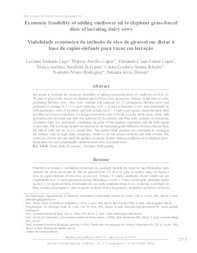Economic feasibility of adding sunflower oil to elephant grass-based diets of lactating dairy cows.
Economic feasibility of adding sunflower oil to elephant grass-based diets of lactating dairy cows.
Author(s): LAGE, L. A.; LOPES, M. A.; LOPES, F. C. F.; GAMA, M. A. S. da; RIBEIRO, C. G. S.; RODRIGUEZ, N. M.; DEMEU, F. A.
Summary: We aimed to evaluate the economic feasibility of adding increasing levels of sunflower oil (0.0, 15, 30, and 45 g/kg of dry matter) to elephant grass (Pennisetum purpureum, Schum) based diets of milkproducing Holstein cows. Data were obtained and analyzed for 12 primiparous Holstein cows that produced on average 16.5 ± 2.8 kg of milk/day, at 95 ± 25 days of lactation. Cows were distributed by milk production, order of lactation, and body weight in a 4 × 4 triple Latin square. Isoproteic diets were provided ad libitum in the form of a forage:concentrate ratio of 60:40, on a dry matter basis. Daily milk production was recorded and milk was analyzed for fat, protein, and fatty acids contents. An economic feasibility study was performed considering the price of the supplied ingredients and the daily intake of each diet. The economic benefit was derived by the determining the difference between income from the sale of milk and the cost of animal feed. The quality-based payment was estimated by averaging the systems used by eight dairy companies, based on fat and protein contents and milk volume. The sunflower oil-free diet provided the greatest economic benefit. Adding sunflower oil to elephant grassbased diets was not economically viable because of its associated costs.
Publication year: 2016
Types of publication: Journal article
Unit: Embrapa Dairy Cattle
Keywords: dairy cattle, economics, milk quality, nutrition
Observation
Some of Embrapa's publications are published as ePub files. To read them, use or download one of the following free software options to your computer or mobile device. Android: Google Play Books; IOS: iBooks; Windows and Linux: Calibre.
Access other publications
Access the Agricultural Research Database (BDPA) to consult Embrapa's full library collection and records.
Visit Embrapa Bookstore to purchase books and other publications sold by Embrapa.

